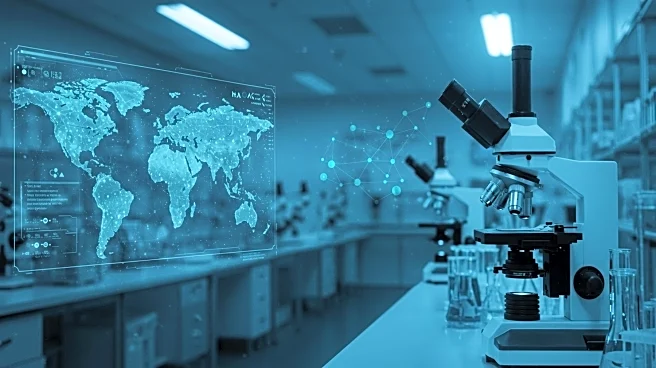What's Happening?
BGI-Research, in collaboration with multiple global institutions, has introduced a groundbreaking single-cell omics technology called Stereo-cell. This advancement, unveiled by the State Key Laboratory of Genome and Multi-omics Technologies, marks a significant leap in cellular analysis. The technology is expected to revolutionize precision medicine, rare disease research, and enhance the fundamental understanding of biological systems. Alongside this technological breakthrough, BGI-Research has launched the '10 Billion Cells Alliance' (10BC), a collaborative effort with 18 institutions worldwide. This alliance aims to decode the fundamental principles of life, fostering global collaboration and accelerating the translation of cutting-edge research into public health benefits. Wang Jian, Chairman and Co-founder of BGI Group, emphasized the potential of these technological breakthroughs to lead to new scientific discoveries and serve a broader international community.
Why It's Important?
The introduction of Stereo-cell technology represents a transformative shift in the field of cellular analysis, with significant implications for precision medicine and rare disease research. By enabling a more comprehensive understanding of cellular functions and disease mechanisms, this technology could lead to more effective treatments and interventions. The '10 Billion Cells Alliance' further underscores the importance of global collaboration in scientific research, as it brings together leading scientists to advance the understanding of life at a cellular level. This initiative not only promises to enhance scientific knowledge but also aims to translate these findings into tangible health benefits, potentially impacting public health policies and practices worldwide.
What's Next?
The launch of the '10 Billion Cells Alliance' sets the stage for extensive collaborative research efforts aimed at decoding life's fundamental principles. As the alliance progresses, it is expected to yield new insights into cellular functions and disease mechanisms, which could inform the development of novel therapeutic strategies. The global scientific community will likely monitor these developments closely, with potential implications for future research funding and policy decisions. Additionally, the successful application of Stereo-cell technology in clinical settings could pave the way for its integration into standard medical practices, further advancing the field of precision medicine.
Beyond the Headlines
The development and deployment of Stereo-cell technology highlight the ethical and cultural dimensions of scientific research, particularly in terms of data sharing and international collaboration. As global institutions work together, issues related to intellectual property, data privacy, and equitable access to technological advancements may arise. Addressing these challenges will be crucial to ensuring that the benefits of this technology are distributed fairly and that collaborative efforts are sustained over the long term.










